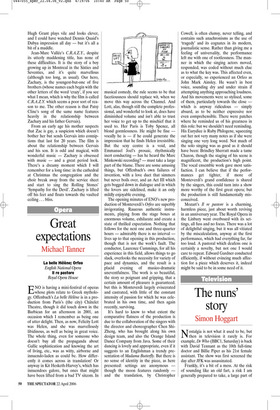Great expectations
Michael Tanner
La belle Hélène; Orfeo English National Opera Il re pastore Royal Opera House ENO is having a mini-festival of operas whose plots relate to Greek mythology. Offenbach’s La belle Hélène is in a production from Paris’s (the city) Châtelet Theatre, though it did touch down in the Barbican for an afternoon in 2001, an occasion which I remember as being one of utter delight. Then, as now, Felicity Lott was Helen, and she was marvellously libidinous, as well as being in great voice. The whole thing, even for someone who doesn’t buy all the propaganda about Gallic sophistication and knowing the art of living, etc., was as witty, airborne and innuendo-laden as could be. How differently it comes across in translation! Or anyway in Kit Hesketh-Harvey’s, which has innuendoes galore, but ones that might have been lifted from a bad TV sitcom. In musical comedy, the rule seems to be that facetiousness should replace wit, when we move this way across the Channel. And Lott, alas, though still the complete professional, and wonderful to look at, does have diminished volume and isn’t able to trust her voice to get up to the mischief that it used to. Her Paris is Toby Spence, all blond gormlessness. He might be fine vocally he is — if he could generate the impression that he finds Helen irresistible. But the sexy centre is a void, and Emmanuel Joel’s prosaic, rhythmically inert conducting — has he heard the Marc Minkowski recording? — must take a large part of the blame. There are some amusing things, but Offenbach’s own failures of invention, with a love duet that simmers but never boils over, and an Act III which gets bogged down in dialogue and in which the lovers are sidelined, make it an only mildly enjoyable evening.
The opening minutes of ENO’s new production of Monteverdi’s Orfeo are superbly invigorating. Raucous authentic instruments, playing from the stage boxes at enormous volume, exhilarate and create a state of thrilled expectation. Nothing that follows for the next one and three-quarter hours — admirably there is no interval lives up to that opening in this production, though that is not the work’s fault. The conductor, Laurence Cummings, for all his experience in this field, allows things to go slack, overlooks the necessity for variety of pace and dynamics, and the result is a placid evening of musico-dramatic uneventfulness. The work is so beautiful, the story so poignant and gripping, that a certain amount of pleasure is guaranteed; but this is Monteverdi largely eviscerated and castrated, with little of the constant intensity of passion for which he was celebrated in his own time, and then again recently, surviving.
It’s hard to know to what extent the comparative flatness of the production is due to the collaboration of the singers with the director and choreographer Chen ShiZheng, who has brought along his own design team, and also the Orange Island Dance Company from Java. Some of their dancing is lovely and appropriate, even if it suggests to an Englishman a trendy presentation of Madama Butterfly. But there is no sense of identity in the piece, as here presented: settings are anonymous though the moon features randomly and the translation, by Christopher Cowell, is often clumsy, never telling, and contains such anachronisms as the use of ‘tragedy’ and its cognates in its modern, journalistic sense. Rather than giving me a feeling of universality, the performance left me with one of rootlessness. The manner in which the singing actors moved, responded, was coded without much clue as to what the key was. This affected even, or especially, so experienced an Orfeo as John Mark Ainsley. He wasn’t in best voice, sounding dry and under strain if attempting anything approaching loudness. And his movements were so stylised, some of them, particularly towards the close which is anyway ridiculous — simply absurd, as to be neither expressive nor even comprehensible. There were patches where he reminded us of his greatness in this role: but we shouldn’t need reminding. His Eurydice is Ruby Philogene, squeezing out her not very many notes as if she were singing one very long word. Not much of the solo singing was as good as it should have been: Brindley Sherratt made a tame Charon, though the staging of his scene is magnificent, the production’s high point. The vocal ensemble work gave most satisfaction. I can believe that if the performances get tighter, if more of Monteverdi’s grand confidence is shared by the singers, this could turn into a show more worthy of the first great opera; but the production is still fundamentally misconceived.
Mozart’s Il re pastore is a charming, harmless piece, just about worth reviving in an anniversary year. The Royal Opera in the Linbury went overboard with its settings, all fuss and no focus. There was a lot of delightful singing, but it was all vitiated by the miscalculation, anyway at the first performance, which had everything far, far too loud. A pastoral which deafens one is certainly a novelty, but not one I would care to repeat. Edward Gardner conducted efficiently, if without evincing much affection for a piece which deserves it, indeed might be said to be in some need of it.


































































 Previous page
Previous page